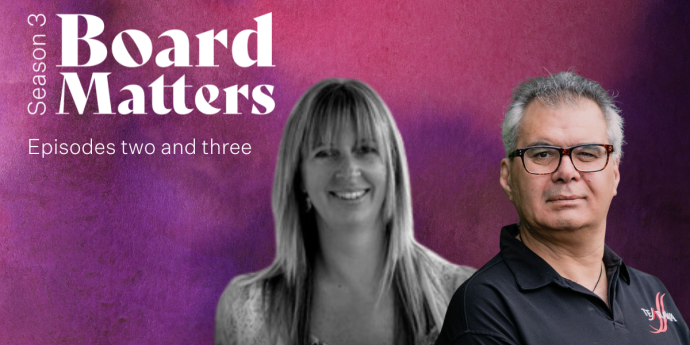The invisible chair: Wayne Boyd on a life in governance
A Distinguished Fellow of the IoD, Wayne Boyd has been deeply influential in New Zealand’s governance culture.

In moments of heightened tension, the temperature rises and maintaining a sense of composure, while also being eager to share your point of view, might be difficult.
For the chair, the task of reining in dominant personalities and creating space in which quieter individuals can speak up, requires tact and artful navigation.
So, what are some of the tools that can be applied to these situations to ensure the board can function with respect and trust?
This season of the Board Matters podcast, by the Institute of Directors, explores what it means to be guided by trust and creating room for effective decision-making in the boardroom.
Being a director, and in particular, a chair, requires a sense of self-awareness and an acute ability to identify what’s happening in the room – gauging body language, sensing the atmosphere and energy, and looking for ways to bring the board together.
Director and entrepreneur, Maria King (MInstD), says people often don’t take into consideration how they respond to others and don’t have an awareness of the impact their reactions might have on those around them.
“I think the word ‘safety’ is an interesting one, isn't it? It's a term we've come to comprehend – ‘psychological safety’ is a place where people feel they can contribute and there's a lack of judgement… people can be themselves,” says King, in conversation with Steven Moe in the latest season of Board Matters.
The concept of ‘safety’, she says, isn’t cut and dried.
“I don't know how you can really assure someone that they're going to be safe in a space.”
King says creating the conditions that allow people to be brave together as a group will contribute to a space where people feel safe.
“That comes down to not being judgmental about who you are as a person… and being open and willing to believe and trust your truth,” says King.
What it doesn’t mean, is attempting to change others’ beliefs or ways of thinking. Instead, it’s about accepting and hearing what they have to say and having the courage to freely contribute at the table. ‘Vulnerability’ is also an important aspect of creating that safety, and King says it takes immense courage to be vulnerable.
“I think everyone is fearful that they won't be accepted or won't be enough for others, but once one person's prepared to be vulnerable and show the courage, it gives others permission to do the same,” she says.
But first, individuals need to be open and willing in themselves to do that, which will also create room to identify opportunities and risks.
“When you're not feeling safe or feeling a bit closed off, your physiological system is going into protection mode… so we tend to be more risk-averse, closed off to opportunities, and we're not as able or as agile when it comes to making decisions,” King says.
Eugene Berryman-Kamp CMInstD, brings a te ao Māori perspective to the table and says he often struggles in meetings and boards where there isn’t “a basic understanding of each other from a whakawhanaungatanga perspective – a relationship perspective”.
The outcome of establishing this connection with others is a greater sense of trust, according to Berryman-Kamp, who says it also transfers across to “an agreed board culture”.
‘Board-only’ time gives the board a chance to assess their performance and look at how they work together as a team, making changes as they see fit. It is also useful in determining where there might be room for further development.
“If you don't make that time to critique your performance and how you work together as a board, it's going to be difficult to create a safe space,” Berryman-Kamp says.
He believes the role of the chair is also a critical component needed to carve out a safe space in the boardroom, but that other board members also actively play a role.
“If you have a high-functioning board that has trust and confidence in each other, then it's not solely the board chair or the deputy chair who reminds people how to operate in a safe manner,” Berryman-Kamp says.
Find out more in episode two of Board Matters where Maria King discusses more about why ‘listening’ is a big part of building trust. And in the third episode, Eugene Berryman-Kamp shares his experience of being ‘called out’ in the boardroom, and why it has contributed to being on a high-performing board.
Listen to the latest season of the Board Matters podcast here.